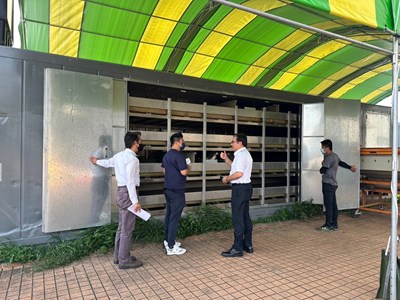
Director Fan Shih-i of the Water Resources Bureau noted that apart from releasing treated wastewater, water resource recovery centers also generate sewage sludge. As Taichung City pushes forward household pipeline connection initiatives, the volume of sewage is on the rise. Consequently, the amount of sludge produced during the treatment of household wastewater is increasing as well, causing environmental concerns and driving up the costs and energy consumption associated with sludge treatment over time.
Director Fan noted that in alignment with Taichung's “Net Zero by 2050” policy and inspired by the success of using black soldier fly breeding technology to manage food waste, they aim to reduce, decarbonize, and reuse sludge with this method. This involves employing black soldier fly automated breeding technology to break down sewage sludge from water resource recovery centers, with the resulting insect bodies and excrement repurposed as fertilizer. This is an innovative low-carbon, low-energy biological sludge treatment that also reduces the carbon emissions associated with conventional sludge treatment. Having received approval from the Ministry of the Interior, trials are currently underway at Taichung City's Wenshan Water Resource Recovery Center.
The Water Resources Bureau affirmed its ongoing commitment to promoting environmental sustainability. Water resource recovery centers, initially focused on sustainable water resource development, have now broadened their scope to encompass environmental sustainability. Across all 9 centers in Taichung City, reclaimed water, sourced from treated domestic sewage, is freely available, which can be utilized for purposes like landscape irrigation and road cleaning, facilitating the goal of water recycling and reuse. Furthermore, regarding the disposal of sewage sludge from water resource recovery centers, apart from the conventional method of dewatering sludge and transporting it to sludge treatment facilities for further processing and utilization, efforts are also being made to reduce environmental impact. This includes projects to reduce sludge volume through drying at the centers, lessening the burden of subsequent cleanup and disposal. In line with global trends, the city government is actively exploring trials of biological treatment of sludge using black soldier fly breeding technology to promote green economic development and achieve goals of reducing environmental pollution and fostering ecological sustainability. (3/19*16)* Water Resources Bureau
Contact person: Miss Yang, Sewer Management Division, Water Resources Bureau, Taichung City Government
Contact number: 04-22289111 ext. 53885

 Facebook
Facebook
 Twitter
Twitter
 LINE
LINE